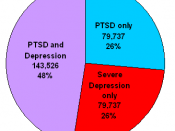GEN/200November 19, 2009University of PhoenixMany people suffer from a mental disorder known as Post-Traumatic Stress Disorder, a condition that I need to solve. Post-Traumatic Stress Disorder, or PTSD, is a very troubling condition to live with. My mind is plagued with difficult memories; memories of the 15 months I spent in Iraq. Even in my sleep I deal with it; my nightmares keep me from a decent night's rest. The time was rough, but the time in America since hasn't been any easier. I brought Iraq home with me. Living with PTSD is my biggest day-to-day problem; it needs a solution, but unlike many other problems it cannot just be "fixed."Personal Effects of PTSDEvery day I encounter situations that bring about a terrifying feeling. When I hear a loud noise, I startle. With a whistling sound, I cringe. When I catch sight of trash or a pothole in a road, I swerve away.
The past cannot be undone; memory cannot just be prodded through to pick and choose what is wanted or unwanted. I have been out of Iraq for two years, and in treatment for one year. Though decreasing, the effects of a long deployment make every day a struggle.
Gathering InformationPost-Traumatic Stress Disorder is a widespread condition, so there are many publications released pertaining to it. I say widespread because there are different types of PTSD; different triggers, causes, treatments, etc. Publications can be found online from medical clinics or different government agencies. Information could also be gathered from support groups, blogs, or passed by word-of-mouth with an individual who has, had, or even studies the condition. The information needed includes answers to certain questions. Who it affects, what triggers it, and why these individuals are affected.
If the source of the information seems reliable,


